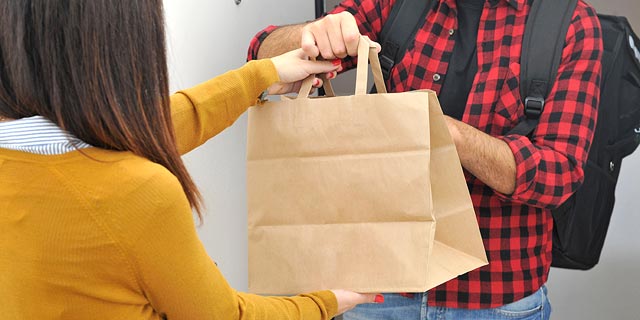
Food Delivery Service with a Heart aims to Take On Wolt and 10bis
The TAKE App integrates donations of restaurants’ food surplus to the needy in its duopoly-busting business model
Meir Orbach | 11:11, 26.05.20
The coronavirus (Covid-19) era marked the golden age of food delivery services. The orange and blue uniforms of 10bis and Wolt couriers painted Israel’s cities and provided a measure of relief for frustrated restaurant owners. The vibrant market now has a fresh player, a new app called TAKE.
TAKE was established in 2018 by businessman and social activist Gil Ben Moshe, who for the last five years headed a non-profit movement, advocating for free access to Israel’s beaches. The company employes 20 people, not including its freelance couriers, and has raised approximately $1.5 million from private investors, including senior figures from the Israeli tech sector. The company’s advisory committee includes Yoram Yaakobi, the former general manager of Microsoft Israel R&D, Eyal Niv, the managing partner of Pitango Venture Capital, and Revital Hendler, the founder of AllJobs. TAKE is currently in the midst of a funding round ahead of its entrance to the Tel Aviv restaurant market.
TAKE’s model aims to create synergy between business interests and social values, with a commitment to match every order on the app with a donation of food surplus to those who need it. When restaurant managers accumulate a surplus that can be donated, they press the ‘give’ button on the app and a TAKE delivery person comes to the restaurant to fetch it and deliver it to the hungry via a network of social activists. The company began a pilot for the new model in the coastal city of Netanya three weeks ago that gained it 10,000 users and resulted in 3,000 food donations to the needy.
“We began developing the company in 2018, before the market became crowded,” Ben Moshe told Calcalist. “There is no other app that combines the business and social responsibility aspects the way we do. We estimate that we can gain a market share of a few tens of percent. The plan is to enter Tel Aviv, then I believe we’ll see serious investment from the venture capital sector. Within six months to a year, we will be ready to succeed in the U.S. market.”
Ben Moshe promises to aim for lower commission rates than those currently charged and anger the restauranteurs, which stand at 27%. “We will charge 10% to 15% commission from the restaurants. We want to help them and they are happy about it. We have proven that we can still be profitable with lower commissions,” he said.
Ben Moshe said that the restaurants still have to adjust to the notion of food donations. “At the start, they tell us that they don’t throw anything away, but we do an excess survey and build a workflow together,” he said.
Asked about the public response so far, Ben Moshe listed the priorities of the Israeli consumer. “The speed of the delivery is most important, then user experience on the app, followed by discounts and price. The social-environmental values come fifth. In addition to the food donations, we also use only biodegradable dishware and cutlery,” Ben Moshe said.
